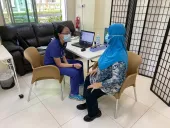
South Asia urged to address healthcare shortages: Amnesty
India has been facing a shortage of medical supplies and human resources.
Governments across South Asia must immediately address healthcare shortages and urgently strengthen their healthcare systems to respond to the rapid surge of COVID-19 cases in the region, urged Amnesty International in a news release.
With India and Nepal’s healthcare systems reaching breaking point, the organization expressed concern that there is a lack of preparedness amongst other countries in the region for the virus’s latest wave.
“Extremely low vaccination rates across South Asia have also left the region highly vulnerable, with pressing action needed at the global level to ensure more equitable access to vaccines,” the organisation said.
The crisis unfolding in India and Nepal must serve as a warning to other countries in the region to invest heavily in surge capacity for an emergency response, said Amnesty International’s Asia-Pacific director Yamini Mishra.
“We are at a critical point. Fewer than one in ten of the region’s population has been vaccinated. The decisions taken by governments in South Asia and across the world in the coming days and weeks will be crucial in mitigating the human cost of this latest surge,” Mishra said.
On 6 May, India reported more than 400,000 new cases in one day, taking its total tally of confirmed cases to 21.5 million, though this is said to be likely an underestimate. Nepal has also started to experience a massive spike in infections.
“We have seen how shortages of oxygen, hospital beds, human resources and essential medicines pushed the already under-resourced healthcare response of India over the edge. Now a similar worrying trend is emerging in Nepal,” Mishra said.
After experiencing a second wave last year, Pakistan, Bangladesh, Afghanistan and Sri Lanka are also witnessing a surge. The new Indian variant has been detected in Sri Lanka and Bangladesh, prompting authorities to close borders and ban travellers from India.
According to media reports, hospital intensive care units in Pakistan, Bangladesh, Sri Lanka and Nepal are now full or close to capacity. Further, according to the World Bank, South Asia has 0.6 hospital beds per 100,000 people, against an average of five in high-income countries.
“With high rates of poverty, fragile health infrastructures, poor socio-economic conditions, inadequate social protection systems, limited access to water and sanitation facilities and inadequate living space, the new wave puts millions of lives in the region at risk,” the organisation said.
Against this backdrop, Mishra urged South Asia’s governments to develop mechanisms for building surge capacity to manage patient loads, sustain essential services, and reduce the social and economic impact of pandemic.
“At the same time, States need to focus on protecting the human rights of the marginalized and vulnerable groups at high risk, including daily wage earners, prisoners, refugees and the internally displaced, by ensuring equitable healthcare,” she added.
Furthermore, Bangladesh, Nepal, and Sri Lanka started receiving vaccine doses through donations from India and other countries, as well as via commercial deals. Amid its current crisis, India temporarily halted exports of vaccines on 24 March to prioritise domestic requirements, leaving the region with a severe shortfall of vaccines.
With that, Amnesty International called on the international community to provide cooperation and assistance, by providing medical tools and removing legal uncertainties and barriers that may impede the production and supply of vaccines.













 Advertise
Advertise













